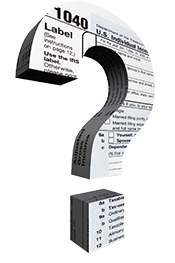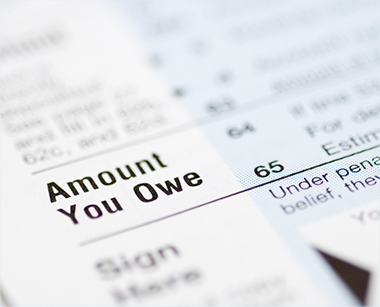5 Surprising Taxable Items
Wages and self-employment earnings are taxable, but what about the random cash or financial benefits you receive through other means? If something of value changes hands, you can bet the IRS considers a way to tax it. Here are five taxable items that might surprise you:
- Scholarships and financial aid. Applying for scholarships and financial aid are top priorities for parents of college-bound children. But be careful — if any part of the award your child receives goes toward anything except tuition, it might be taxable. This could include room, board, books, travel expenses or aid received in exchange for work (e.g., tutoring or research).

Tip: When receiving an award, review the details to determine if any part of it is taxable. Don’t forget to review state rules as well. While most scholarships and aid are tax-free, no one needs a tax surprise. - Gambling winnings. Hooray! You hit the trifecta for the Kentucky Derby. But guess what? Technically, all gambling winnings are taxable, including casino games, lottery tickets and sports betting. Thankfully, the IRS allows you to deduct your gambling losses (to the extent of winnings) as an itemized deduction, so keep good records.
Tip: Know when the gambling establishment is required to report your winnings. It varies by type of betting. For instance, the filing threshold for winnings from fantasy sports betting and horse racing is $600, while slot machines and bingo are typically $1,200. But beware, the gambling facility and state requirements may lower the limit.
- Unemployment compensation. Congress gave taxpayers a one-year reprieve in 2021 from paying taxes on 2020 unemployment income. Unfortunately, this tax break did not get extended for the 2021 tax year. So, unless Congress passes a law extending the tax break, unemployment will once again be taxable starting with your 2021 tax return.
Tip: If you are collecting unemployment, you can either have taxes withheld and receive the net amount or make estimated payments to cover the tax liability.
- Social Security benefits. If your income is high enough after you retire, you could owe income taxes on up to 85% of Social Security benefits you receive.
Tip: Consider if delaying when you start collecting Social Security benefits makes sense for you. Waiting to start benefits means you’ll avoid paying taxes on your Social Security benefits for now, plus you’ll get a bigger payment each month you delay until you reach age 70.
- Alimony. Prior to 2019, alimony was generally deductible by the person making alimony payments, with the recipient generally required to report alimony payments received as taxable income. Now the situation is flipped: For divorce and separation agreements executed since December 31, 2018, alimony is no longer deductible by the payer and alimony payments received are not reported as income.
Tip: Alimony payments no longer need to be made in cash. Consider having the low-income earning spouse take more retirement assets such as 401(k)s and IRAs in exchange for reduced alimony payments. This arrangement would allow the higher-earning spouse to make alimony payments by transferring retirement funds without paying income taxes on it.
When in doubt, it’s a good idea to keep accurate records so your tax liability can be correctly calculated and you don’t get stuck paying more than what’s required.
 With the April 15 tax filing deadline right around the corner, here are answers to some common tax questions.
With the April 15 tax filing deadline right around the corner, here are answers to some common tax questions.
- When will I get my refund? The pandemic and additional stimulus payments will, in all probability, delay refund payments. But as of now here are the old wait times to receive your refund.
* E-file return with a direct deposit – 1 to 3 weeks
* E-file return with a mailed check – 1 month
* Paper file return with a direct deposit – 3 weeks
* Paper file return with a mailed check – 2 months
NOTE: If you want exact information on the status of YOUR refund go to www.irs.gov/refund and follow their instructions.
- What’s the most common delay in completing a tax return? Missing items! W-2 and 1099 forms are some of the most common tax documents to go missing. If you have multiple jobs, whether full-time or part-time, you’ll be getting multiple documents in the mail. It’s easy to lose track of all these documents if you don’t have one place you put them once received.
- Can I still get a stimulus payment? If you’re still waiting on either the 2020 or 2021 stimulus payment, file your 2020 tax return and claim the Recovery Rebate Credit. This is why it is important to keep track of any payments you receive from the government during the year. You will need them to account for any missing payments or underpayments.
- Can I correct a tax form that has an incorrect dollar amount? If you receive a tax document with incorrect information, contact the company that issued the document and try to get it fixed immediately. If you can’t get a corrected form right away, include both the incorrect form and the correct dollar amount when turning in your tax documents to have your return prepared.
- Can I deduct charitable contributions if I don’t itemize? In 2020 you can claim a $300 charitable contribution deduction regardless of whether or not you itemize your deductions. If you missed this window of this above-the-line donation in 2020, never fear as it is also available in 2021 with an increased limit to $600 for married couples. So, save those donation receipts!
- Is this taxable? While there are always exceptions, the most common taxable items that are questioned include unemployment benefits and withdrawals from non-Roth retirement accounts. Some things, like Social Security, are often, but not always, taxable.
5 Surprising Taxable Items
 Wages and self-employment earnings are taxable, but what about the random cash or financial benefits you receive through other means? If something of value changes hands, you can bet the IRS considers a way to tax it. Here are five taxable items that might surprise you:
Wages and self-employment earnings are taxable, but what about the random cash or financial benefits you receive through other means? If something of value changes hands, you can bet the IRS considers a way to tax it. Here are five taxable items that might surprise you:
1. Scholarships and financial aid. Applying for scholarships and financial aid are top priorities for parents of college-bound children. But be careful — if any part of the award your child receives goes toward anything except tuition, it might be taxable. This could include room, board, books, travel expenses or aid received in exchange for work (e.g., tutoring or research).
Tip: When receiving an award, review the details to determine if any part of it is taxable. Don’t forget to review state rules as well. While most scholarships and aid are tax-free, no one needs a tax surprise.
2. Gambling winnings. Hooray! You hit the trifecta for the Kentucky Derby. But guess what? Technically, all gambling winnings are taxable, including casino games, lottery tickets and sports betting. Thankfully, the IRS allows you to deduct your gambling losses (to the extent of winnings) as an itemized deduction, so keep good records.
Tip: Know when the gambling establishment is required to report your winnings. It varies by type of betting. For instance, the filing threshold for winnings from fantasy sports betting and horse racing is $600, while slot machines and bingo are typically $1,200. But beware, the gambling facility and state requirements may lower the limit.
3. Unemployment compensation. Unfortunately the IRS doesn’t give you a break on the taxes for unemployment income. Unemployment benefits you receive are taxable.
Tip: If you are collecting unemployment, you can either have taxes withheld and receive the net amount or make estimated payments to cover the tax liability.
4. Crowdfunding. A popular method to raise money for new ventures or to support a special cause is crowdfunding through websites. Whether or not the funds are taxable depends on two things: your intent for the funds and what the giver receives in return. Generally, funds used for a business purpose are taxable and funds raised to cover a life event (e.g., special causes or medical assistance) are considered a gift and not taxable to the recipient.
Tip: Prior to using these online tools to raise money, review the terms and conditions and ask for a tax review of what you are doing. If you need to account for taxes, reserve some of what you raise for this purpose.
5. Cryptocurrency. Cryptocurrencies like Bitcoin are considered property by the IRS. So if you use cryptocurrency, you must keep track of the original cost of the coin and its value when you use it. This information is needed so the tax on your gain or loss can be properly calculated. Remember, the tax rate on property can vary if you own the cryptocurrency more than a year, so record all dates.
Tip: For those considering replacing cash with things like Bitcoin, you need to understand the gain or loss complications. For this reason, many people using cryptocurrency do so for speculative investment purposes.
When in doubt, it’s a good idea to keep accurate records so your tax liability can be correctly calculated and you don’t get stuck paying more than what’s required.
Ah, summer. The weather is warm, kids are out of school, and it’s time to think about tax saving opportunities! Here are five ways you can enjoy your normal summertime activities and save on taxes:
- Rent out your property tax-free. If you have a cabin, condo, or similar property, consider renting it out for two weeks. The rental income you receive on property rented for less than 15 days per year is not considered taxable income. In addition, you can still deduct your mortgage interest expense and property taxes in full as itemized deductions! Track the rental days closely — going over 14 days means all rent is taxable and rental income rules apply.
- Take a tax credit for summer childcare. For many working parents, the summer comes with the added challenge of finding care for their children. Thankfully, the Child and Dependent Care Credit can cover 20-35 percent of qualified childcare expenses for your children under the age of 13. Eligible types of care include day care, nanny fees and day camps (overnight camps and summer school do not qualify).
- Hire your kids. If you own a business, hire your kids. If you are a sole proprietor and your child is under age 18, you can pay them to work without withholding or paying Social Security and Medicare tax.
- Have a garage sale. In general, the money you make from a yard or garage sale is tax-free because you sell your goods for less than you originally paid for them. Once the sale is over, donate the remaining items to a qualified charity to get a potential charitable donation deduction. Just remember to keep a log of the items you donate and ask for a receipt.

- Start a Roth IRA for your children. Roth IRA contributions are limited to the amount of income your child earns, so earned income is key. This can include income from mowing lawns or selling lemonade. Start making contributions as soon as your child makes some money to take advantage of the tax-free earnings available in a Roth IRA.
Taking the time this summer to execute these tips can put extra money in your pocket right away and provide you tax-saving happiness in the future.
 As the end of the year approaches, there is still time to make moves to manage your tax liability. Here are some ideas to consider.
As the end of the year approaches, there is still time to make moves to manage your tax liability. Here are some ideas to consider.
Maximize your retirement plan contributions. This includes traditional IRAs, Roth IRAs, and SEP IRAs for self-employed. Now is the time to maximize the contribution potential for this year and plan for next year’s contributions.
Estimate your current and next year taxable income. With this estimate you can determine which year receives the greatest benefit from a reduction in income. By understanding what the tax rate will be for your next dollar earned, you can understand the tax benefit of reducing income in this year versus next year.
Make charitable contributions. Consider which tax year will benefit most from your charitable giving of cash and non-cash items. Shift your giving into the year that will provide you the most benefit.
Take capital losses. Each year you can net capital losses against capital gains. You can also deduct up to $3,000 in excess losses against your other income. Start to identify which investments may make sense to sell to take advantage of this. If planned correctly, these losses can offset ordinary income.
Consider donating appreciated stock. This strategy gives you a charitable deduction for the market value of the stock, while not having to pay capital gains tax on the charitable gift. If you provide an annual pledge sheet to your church, this can be a great way to maximize your gift while giving needed funds to your church at the beginning of the year.
Retirement plan distributions. If you are age 70½ or older, take your required minimum distributions for the year. If you are retired, but younger than 70½, consider taking tax efficient distributions from your retirement accounts. By paying some tax now, you may avoid paying higher taxes later when you have to follow the minimum distribution rules.
Consider tax legislation. Please recall that tax laws passed in late 2016 made many temporary tax savings permanent and extended others into 2017. So save classroom related receipts if you are a teacher. Consider charitable contributions from your retirement plan if you are a senior. Keep receipts of large purchases to track a potential sales tax deduction.
Two-thirds of the Baby Boomer generation are now working or plan to work beyond age 65, according to a recent Transamerica Institute study. Some report they need to work because their savings declined during the financial crisis, while others say they choose to work because of the greater sense of purpose and engagement that working provides. Whatever your reason for continuing to work into your golden years, below is Part 1 of a 2-part series with tips to make sure you get the greatest benefit from your efforts.
- Consider delaying Social Security. You can start receiving Social Security retirement benefits as early as age 62, but if you continue to work it may make sense to delay taking it until as late as age 70. This is because your Social Security benefit may be reduced or be subject to income tax due to your other income. In addition, your Social Security monthly benefit increases when you delay starting the retirement benefit. These increases in monthly benefits stop when you reach age 70.
- Don’t get bracket-bumped. Keep in mind that you may have multiple income streams during retirement that can bump you into a higher tax bracket and make other income taxable if you’re not careful. For instance, Social Security benefits are only tax-free if you have less than a certain amount of adjusted gross income ($25,000 for individuals and $32,000 for married filing jointly in 2017), otherwise as much as 85 percent of your benefits are taxable. Required distributions from pensions and retirement accounts can also add to your taxable income. Be aware of how close you are to the next tax bracket and adjust your plans accordingly.
- Be smart about health care. When you reach age 65, you’ll have the option of making Medicare your primary health insurance. If you continue to work, you may be able to stay on your employer’s health care plan, switch to Medicare, or adopt a two-plan hybrid option that includes Medicare and a supplemental employer care plan. Look over each option closely. You may find that you’re giving up important coverage if you switch to Medicare prematurely while you still have the option of sticking with your employer plan.